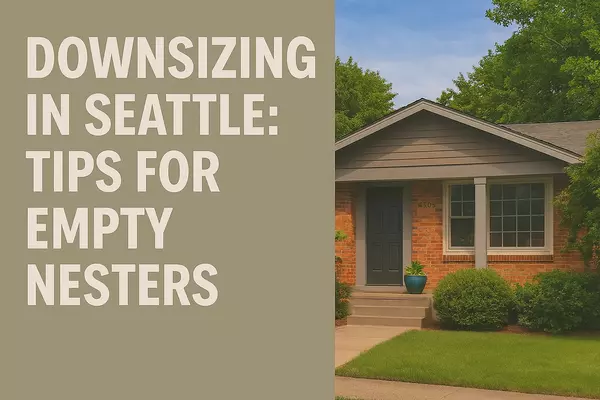Moving to Seattle from Out of State? Here’s What to Expect

Moving to Seattle from Out of State? Here’s What to Expect
Moving to Seattle is exciting: the mountains, the water, the vibrant tech and arts scene, but it also comes with some trade-offs. If you’re relocating to the Emerald City, here’s what you can expect in terms of lifestyle, costs, and settling in.
Why People Move to Seattle
Seattle continues to attract newcomers for good reason. The city offers a strong job market fueled by tech, biotech, aerospace, and healthcare. Its natural beauty is unmatched: you can hike in the Cascades, kayak on Lake Union, or ski at Stevens Pass all within a short drive. On top of that, Seattle has a thriving food, music, and cultural scene that gives it a cosmopolitan edge, while still being a gateway to quieter escapes like the Olympic Peninsula, Vancouver, and Portland.
The Cost of Living
One of the biggest adjustments for out-of-state movers is the cost of living. Seattle is about 45% more expensive than the U.S. average, according to PayScale. Housing is the largest factor:
-
Average rent: ~$2,221/month (Zillow, 2025)
-
One-bedroom apartment: ~$1,973/month (Apartment List, 2025)
-
Median home price: ~$899,000 (Flyhomes, 2025)
-
Salary needed for “rent comfort” (30% income rule): ~$91,000 (Zillow/Axios, 2025)
Beyond housing, groceries, utilities, and transportation also run higher than the national average, so newcomers should budget with plenty of cushion.
Weather and Lifestyle Adjustments
If you’re coming from sunnier or drier states, Seattle’s climate may take some getting used to. The city does get rain, often a light drizzle rather than heavy downpours, and cloudy days are common in fall and winter. Winters also bring short daylight hours, while summer evenings can stretch beautifully late. Locals adapt with waterproof gear and a love of layering. At the same time, the outdoors are a major part of life here. Hiking trails, biking routes, skiing, and waterfront activities are embedded in Seattle’s culture, making it easy to stay active year-round despite the weather.
Where to Live
Each neighborhood has its own personality, and the right fit depends on your lifestyle:
-
Urban core: Capitol Hill, Belltown, South Lake Union — vibrant nightlife, walkability, and higher rents.
-
Balance of cost & character: Ballard, Fremont, Northgate, Beacon Hill — more space with unique community vibes.
-
Family-friendly suburbs: Shoreline, Bellevue, Kirkland, Redmond — strong schools, larger homes, and longer commutes.
Transportation and Commuting
Traffic is a reality in Seattle, but there are several ways to get around:
-
Driving: Common but expect congestion on I-5, SR-99, and I-405.
-
Public transit: Sound Transit light rail is expanding; buses are widely used.
-
Ferries: Popular for island commuters and weekend getaways.
-
Biking and walking: Growing infrastructure supports a car-light lifestyle in central areas.
-
Parking: Limited and costly downtown, which pushes many toward alternatives.
Job Market and Economy
For many, the move to Seattle is career-driven. The region is home to Amazon, Microsoft, Boeing, and a growing ecosystem of startups and biotech firms. Healthcare and green energy are also expanding. While the job market is strong, competition can be fierce, and many positions require specialized skills. Relocating with a job lined up is ideal, but a financial cushion helps if you’re still searching once you arrive.
Culture Shock and Local Quirks
Adjusting to Seattle life often comes with surprises. The “Seattle Freeze” is something newcomers mention frequently. People are polite but can be slow to form close friendships. Coffee culture is ingrained in daily life, sustainability is treated as a priority, and casual yet practical fashion (think rain jackets and fleece) is the norm. While it may take time to find your circle, once you do, communities here are welcoming and active.
Tips for a Smooth Move
A few steps can make your relocation easier:
-
Visit first to explore neighborhoods before choosing where to live.
-
Budget generously for rent, deposits, and moving costs.
-
Start with a short-term rental to get settled before buying.
-
Work with a local real estate agent who knows the neighborhoods.
-
Tap into community groups, local events, and even Seattle Public Library programs to get connected faster.
Final Takeaway
Relocating to Seattle from out of state is more than just a move, it’s an adjustment to a new lifestyle. Yes, costs are high and the weather requires some patience, but the payoff is a city surrounded by breathtaking landscapes, powered by a thriving economy, and filled with opportunities for both work and play. With the right planning, you can embrace your new city and make the most of everything Seattle has to offer.
Recent Posts











Isaac Fairfield
Phone
